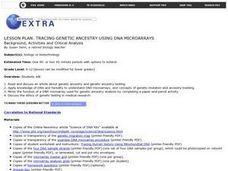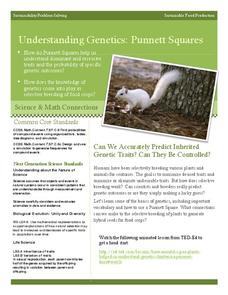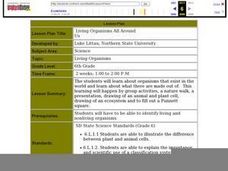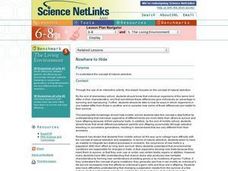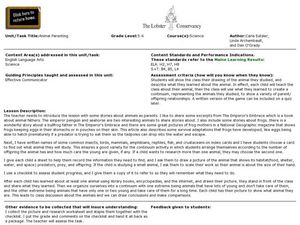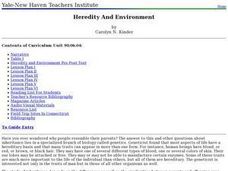Curated OER
Here's Looking at You
High schoolers assess some common inherited traits which are easily observable and note their phenotype for the trait. Students compare their phenotypes to those of their parents and attempt to describe the pattern and manor of inheritance.
Curated OER
High-Tech Food: Science in Your Shopping Cart
Kids are given a lot to think about, as they delve into the world of high-tech foods. They discuss GMOs, biotechnology, food enhancements and domestication. They view videos, engage in class discussions, complete worksheets, and learn...
Curated OER
Tracing Genetic Ancestry Using DNA Microarrays
High school learners read and discuss an article about genetic ancestry and genetic ancestry testing. They complete a paper and pencil activity that mimics the function of a DNA microarray and consider the ethics of genetic testing in...
University of Pennsylvania
Evolution by Natural Selection
A diagram, data table, and reading passage top this resource. Through it, biology beginners are introduced to the concept of natural selection. They answer some questions and then participate in a simulation using fabric as a habitat and...
Curated OER
Genetics Practice 3: Probability Practice
Practice calculating genetic probability, listing gametes, and identifying genotypes. The worksheet combines short answer questions with practice problems to solve. It would make a revealing review assignment or even a practical pop quiz...
Curated OER
Families and Heredity
Personality traits and physical appearance traits within families are the focus here. Learners make a poster which lists the shared physical traits they have with their family. Peers look at each poster and write down the traits they see...
Curated OER
Where It Comes From: All About Heredity
Characteristics are not only inherited, but can be acquired through interactions with the environment.
Western Kentucky University
Understanding Genetics: Punnett Squares
Can scientists really predict genetic outcomes or are they simply making a lucky guess? Scholars first learn about Gregor Mendel and how to make Punnett squares. Then they extract DNA from a strawberry in a lab with included conclusion...
Curated OER
Genetic Disorders
Students examine how living cells create new cells and how genetic mutations can cause disorders and be inherited. In this genetic reproductionn lesson students create their own PowerPoint presentation.
Curated OER
Living Organisms All Around Us
Sixth graders study organisms that exist in the world and what they are made up of. They participate in a nature walk, a presentation, a drawing of an animal and plant cell, draw a ecosystem, and fill out a Punnett square.
Curated OER
Genetic Disorders
Students examine how living cells reproduce and how traits are passed on. In this genetic reproduction lesson students research a topic and present it to the class.
Curated OER
Reptiles and Amphibians
Introduce your class to various reptiles and amphibians. They will meet and identify a representative from each of the four major reptile families, then learn about and discuss reptile characteristics. Next, they will identify and...
Curated OER
Where Are the Dinosaurs?
Young scholars explore the concept of extinction by studying dinosaurs. In this dinosaur instructional activity, students distinguish between extinct creatures and those that still exist.
Curated OER
Inherited Traits
Young scholars work with a partner to complete an inventory of their traits and compare and discuss their unique qualities. In this biology instructional activity, students determine percentages for the frequency of observed traits of...
Curated OER
Nowhere to Hide
Students examine the topic of natural selection. As a class, they write their own definition to survival of the fittest and watch a video. Using the internet, they research how Darwin started to examine this process using finches and how...
Curated OER
Blood Typing Investigation
Young scholars role-play a scenario in which a car crash patient is inadvertently given the wrong blood type during a transfusion. They perform blood typing and explore the genetics behind ABO and RH blood types using simulated blood.
Curated OER
Turtle Shell Craft
Have your class learn about turtles and adaptation using this lesson. Learners discuss turtles, the unique design of their shells, and the ways they have adapted to their surroundings. Then, they make a paper bag model to simulate a...
Curated OER
Animal Parenting
Students analyze parenting instincts. In this parenting instincts lesson, students view a drawing of animal they studies and describe what they learned about the animal. Students teach the class about their animal and the class creates a...
Curated OER
Graph Those Stickers!
Students graph fruit. In this graphing lesson students create a graph using fruit label stickers. Students place a sticker on the graph when the fruit has been consumed.
Curated OER
Standard 4 Review Sheet-Genetics and Inheritance
For this genetics worksheet, learners answer a variety of questions about inheritance, DNA, the genetic code, genes, sexual and asexual reproduction, mutations, protein synthesis and genetic engineering.
Curated OER
Genetic Variation Worksheet
Fill- in-the-blank, labeling, and short answer questions make up this well-written cell division worksheet. Neat diagrams of chromosomes and dividing cells are included. Junior biologists show what they know about reproduction, meiosis,...
Curated OER
Heredity And Environment
Students complete a pre-test on the relationship between heredity and the environment. As a class, they write down descriptions of themselves and identify which traits can be changed and not changed. In groups, they determine which genes...
Curated OER
Yeast: A Dihybrid Cross
Students create a yeast dihybrid cross and follow two forms of each of two traits: red growth versus cream color, and tryptophan-dependent versus tryptophan-independent. They complete diagrams to represent the alleles, predict the...
Curated OER
The Probabilities of Problems: A Look at Genetic Inheritance
Discuss an article about families affected by genetic disorders and their decisions about whether or not to evaluate their own genetic information. Investigate four different inherited disorders. Participate in a probability exercise....
Other popular searches
- Baby Animals and Parents
- Animal Babies and Parents
- Animal Parents and Offspring
- Parents and Offspring Names




